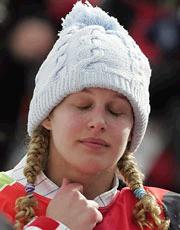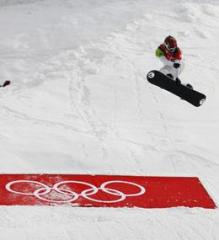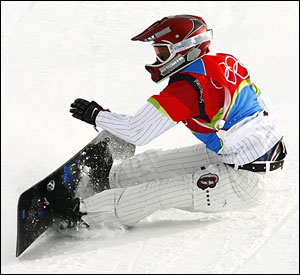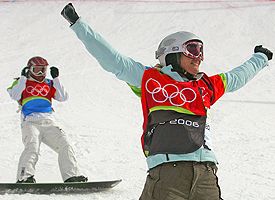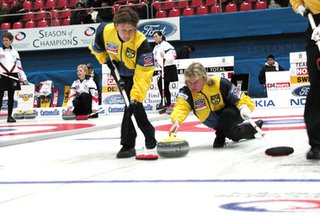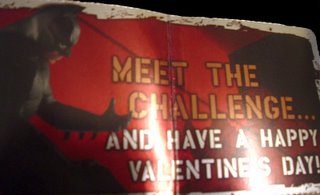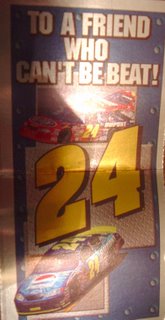The Hurricane

The Olympics breeds heroes. The right kind of heroes. The ones whose greatness is defined by more than medals and whose sheen sometimes shows signs of tarnish.
As we look back on the 2006 Winter Olympics in Torino, we find this particular hero.
We find the symbol of the competitive spirit. It emerges through muck of television's so-called "Chevy Olympic Moments" that -- for the sake of corporate brand identity --hijack and exploit the lives of men and women who give us a glimpse of their souls through the prism of the pursuit of accomplishment.
We find the fire nearly suffocated beneath the sanctimonious media information filterers who deify and demonize, depending on what pre-cooked expectations are met or not realized.
Apolo Anton Ohno. Shaun "The Flying Tomato" White. Joey Cheek. Ted Ligety.
These are but a few of the more-celebrated winners we'll remember.
As we should.
Whether we'll remember Jeret "Speedy" Peterson, though, is not so certain.
The 24-year-old Idaho native finished seventh in the standings of the freestyle skiing aerials. The aerial competition features daredevils soaring off a ramp -- sometimes five stories above the ground -- and twisting and contorting through the air like crazed-but-somehow-graceful birds in flight.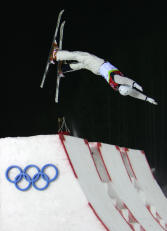
Yet, he went for it. "The Hurricane."
For the time being, it's the toughest and scariest move with the highest degree of difficulty in the sport -- a three-flip, five-twist maneuver 50 feet in the air that defies the very real possibility of snapping a neck.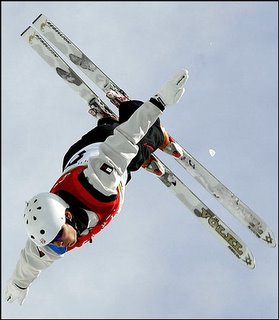
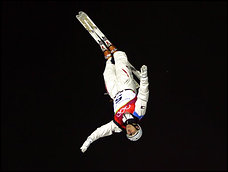
When he qualified for the finals earlier in the week, he told an NBC reporter that Italy wouldn't know what storm had hit them by the time he was done. His enthusiasm was playful, idealistic, infectious.
When it came time, he went for it. He performed the The Hurricane to near-perfection, until he landed, just so, with his rear-end and right hand slightly dragging the snow. He raised his left arm to try to fool the judges, but it didn't work.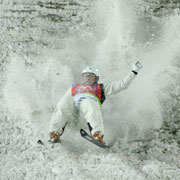
The degree of difficulty was scored high, but the landing judges negated the gains in the aerial display.
As they probably had to. If you measure success by hardware.
If he had tried a trick with a lower degree of difficulty, he very likely would have won a medal (after watching Sasha Cohen fall, the Japanese figure skater who won gold took the safer route and held back on the more-difficult moves she had planned).
That isn't what Speedy Peterson came for. He came for a hurricane, not a thunderstorm:
"That's what the Olympics are about. They're about going for it and being the best. Or trying your best and failing. They're not about holding back. I came here to do The Hurricane. I would have done it if I was 50 points behind or 50 points ahead. I never thought about not doing it. I'm disappointed, but I am trying to advance my sport, take it to a higher level. I came here to do the Hurricane in the Olympics, and I did. No regrets."
Peterson, as he tells it, was molested as a child. He lived a childhood of rebellion, self-blame and anger. He tells children similarly abused not to blame themselves. That's why he made his abuse public three years ago.
Last summer, he watched his close friend put a gun to his temple and pull the trigger. When he was 5, a drunk driver killed his sister.
His friend gave up his life. His sister lost hers. Peterson remembers their lives to help him relish in his own.
As his move would testify, he lives on the margins of potential oblivion.
He skydives and rides motorcycles at 150 mph.
Last summer, he took $5,000 he earned at Home Depot and turned it into more than $200,000 after a trip to Las Vegas.
Yesterday, a day before the closing ceremony, U.S. Olympics officals sent him home after a drunken, late-night brawl in which he punched a friend in the face and forced police to separate the two.
He is a tarnished hero.
A medal might have hidden that a bit, perhaps provided a distracting light to blind everyone to the darkness men like him fight like mad not to succumb to.
But the medal, too, would have tarnished eventually.
And all he'd be left with was the memory of what he did when he was here.
He did what he came to do.
